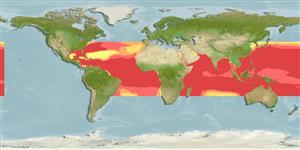Common names from other countries
Environment: milieu / climate zone / depth range / distribution range
Ecologia
marinhas; oceanódromo (Ref. 51243); intervalo de profundidade 0 - 20 m. Subtropical; 40°N - 25°S
Indo-West Pacific: Red Sea and South Africa (including the Mascarenes, Ref. 33390) to southern Japan, Taiwan, Mariana, Caroline and Solomon islands, Queensland and the Arafura Sea (Ref. 9819). Western Atlantic: New Jersey, USA and northern Gulf of Mexico (Ref. 7251) to Rio de Janeiro, Brazil. Eastern Atlantic: Guinea to Gabon.
Tamanho / Peso / Idade
Maturity: Lm ? range ? - ? cm
Max length : 40.0 cm TL macho/indeterminado; (Ref. 5217); common length : 25.0 cm TL macho/indeterminado; (Ref. 5217)
Espinhos dorsais (total): 0; Raios dorsais moles (total): 12-14; Espinhos anais 0; Raios anais moles: 9 - 11. Body dark, iridescent blue dorsally, silvery white below; pectorals bluish black; dorsal fin with prominent black spot (Ref. 2797).
Inhabits both neritic and oceanic surface waters (Ref. 30573). Capable of leaping out of the water and gliding for long distances above the surface (Ref. 30573). Feeds mostly on crustaceans and other planktonic organisms; often attracted to lights at night (Ref. 2797).
Life cycle and mating behavior
Maturidade | Reprodução | Desova | Ovos | Fecundidade | Larvas
Parin, N.V., 1996. On the species composition of flying fishes (Exocoetidae) in the West-Central part of tropical Pacific. J. Ichthyol. 36(5):357-364. (Ref. 27313)
Categoria na Lista Vermelha da IUCN (Ref. 130435)
CITES (Ref. 128078)
Not Evaluated
Ameaça para o homem
Harmless
Utilização humana
Pescarias: pouco comercial
Mais informação
ReferênciasAquaculturaPerfil para aquaculturaEstirpesGenéticaElectrophoresesHereditariedadeDoençasProcessamentoMass conversion
ColaboradoresFotografiasStamps, Coins Misc.SonsCiguateraVelocidadeTipo de nataçãoÁrea branquialOutras referênciasCérebrosVisão
Ferramentas
Relatórios especiais
Descarregue XML
Fontes da internet
Estimates based on models
Preferred temperature (Ref.
115969): 21.7 - 29.1, mean 27.5 (based on 25528 cells).
Phylogenetic diversity index (Ref.
82804): PD
50 = 0.5000 [Uniqueness, from 0.5 = low to 2.0 = high].
Bayesian length-weight: a=0.00646 (0.00292 - 0.01429), b=3.04 (2.84 - 3.24), in cm Total Length, based on LWR estimates for this (Sub)family-body shape (Ref.
93245).
Nível Trófico (Ref.
69278): 3.3 ±0.38 se; based on food items.
Resiliência (Ref.
120179): Elevada, tempo mínimo de duplicação da população menor que 15 meses (K=0.8).
Fishing Vulnerability (Ref.
59153): Low vulnerability (21 of 100).
